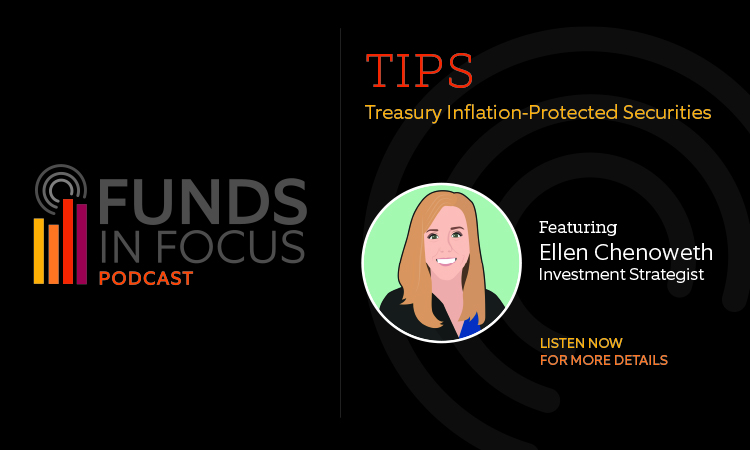Investors have been flocking to gold—an investment known for its inflation hedging characteristics. But what is the likelihood of rising inflation, and is gold the right tool to protect against inflation risk?
On a recent episode of our Funds in Focus podcast, we spoke with Associate Investment Strategist Ellen Chenoweth about some of the drivers behind the inflation debate and potential investment strategies to position portfolios for rising inflation.
In this episode, you'll learn
- Why investors are starting to pay closer attention to the risk of inflation
- What risks advisors should be paying attention to
- How to potentially protect against these risks
- How the 2020 election could affect the inflation rate
THE INVESTMENT RATIONALE FOR GOLD
Precious metal prices have been on the rise as we’ve seen increased investor interest in gold. Investors typically turn to gold as it has the potential to be a useful tool for at least one of three purposes: a safe haven asset, a US dollar hedge, or a potential inflation hedge.
While a case could be made for all of these gold investment rationales, of particular interest is the inflation use case. The inflation debate has been gathering steam recently, as investors consider whether rising inflation may be on the horizon, and whether they should position portfolios in an effort to protect against a potential inflationary environment.
ARE WE AT RISK OF RISING INFLATION?
While current data reflects a market belief that inflation will remain muted for the next few years,¹ inflation has historically been volatile and difficult to predict. And there are several reasons why rising inflation could be in the not-so-distant future.
First, both economic and fiscal government policy in response to the pandemic crisis has pumped trillions of dollars into the economy, resulting in a markedly increased money supply. And while globalization is a widely cited source of deflationary pressure, global trade has been slowly declining² amid pandemic disruptions and rising trade tensions.
In addition, many businesses are raising prices and imposing surcharges on services to recoup pandemic-related losses. This could directly impact inflation as higher prices are passed onto consumers.
Finally, a democratic sweep in the US 2020 elections could result in policy that has the potential to be near-term inflationary. Greater technology sector regulation, additional programs to ease the student debt burden, or additional stimulus in the form of direct payments to consumers could all contribute to near-term price pressures.
IS GOLD THE RIGHT INFLATION HEDGE?
Many investors view gold as an effective tool for inflation hedging. However, while gold does exhibit positive correlation with inflation, that correlation has historically been volatile over time. Further, there are other asset classes commonly potentially used as inflation hedges—such as natural resource equities and TIPS—that exhibit stronger correlations to inflation than gold, and these correlations are less volatile.³
CONSIDERATIONS FOR INVESTING IN TIPS
TIPS are fixed income securities that are issued by the US treasury. They come with a fixed coupon and their principle is adjusted up or down with inflation or deflation, thereby offering inflation protection.
However, an often overlooked and underappreciated risk with TIPS investing is the duration—or the sensitivity of bond prices to interest rate changes—drift that market cap weighted indexes can exhibit, potentially introducing significant interest rate risk.
As TIPS cash flows are dependent on future realized inflation, they can be very difficult to predict. For example, a dramatic drop in inflation expectations such as the one at the onset of the COVID-19 crisis resulted in lower expected future cash flows, effectively driving durations higher.
As TIPS durations can be variable, an index that targets a specific duration can be a solution to avoid the additional interest rate risk that could come with duration drift. We have found that indexes that target short duration TIPS demonstrate better correlation to inflation allow for better risk budgeting in a portfolio context.
Please see our FlexShares iBoxx® 3-Year Target Duration TIPS Index Fund (TDTT) and FlexShares iBoxx® 5-Year Target Duration TIPS Index Fund (TDTF) for more information on how our FlexShares target duration ETFs can help protect portfolios against rising inflation.
¹As measured by the 5-year US breakeven inflation rate, which is the difference between the 5-Year Treasury Constant Maturity Rate and the yield on an inflation protected security with 5-yearsremaining to maturity.
The latest value implies what market participants expect inflation to be in the next 5 years, on average.
²Gertken, M. (2020, March 20). De-Globalization Confirmed. Retrieved September 2020, from
https://www.bcaresearch.com/reports/view_report/29423/gps
³NTAM
IMPORTANT INFORMATION
Before investing, carefully consider the FlexShares investment objectives, risks, charges and expenses. This and other information is in the prospectus and a summary prospectus, copies of which may be obtained by visiting www.flexshares.com. Read the prospectus carefully before you invest.
Foreside Fund Services, LLC, distributor.
An investment in FlexShares is subject to numerous risks, including possible loss of principal. Fund returns may not match the return of the respective indexes. A full description of risks is in the prospectus.
FlexShares iBoxx® 3-Year Target Duration TIPS Fund (TDTT) and the FlexShares iBoxx® 5-Year Target Duration TIPS Index Fund (TDTF) are passively managed and primarily use a replication strategy to track their underlying index. Use of a replication strategy creates tracking risk where the Fund’s performance could vary substantially from the performance of the underlying index along with the risk of high portfolio turnover. They may invest in derivative instruments. Changes in the value of the derivative may not correlate with the underlying asset, rate or index and the Funds could lose more than the principal amount invested. The Funds are subject to fluctuation of yield risk, income risk, inflation protected security risk and interest rate/maturity risk. The Funds are non-diversified meaning the Funds’ performance may depend on the performance of a small number of issuers because the Funds may invest a large percentage of its assets in securities issued by or representing a small number of issuers.
The iBoxx® 3-Year Target Duration TIPS Index and iBoxx® 5-Year Target Duration TIPS Index are the intellectual property (including registered trademarks) of Markit iBoxx® and/or its licensors ("Licensors"), which is used under license. The securities based on the Index are in no way sponsored, endorsed, sold or promoted by Markit iBoxx® and its Licensors and neither of the Licensors shall have any liability with respect thereto.

